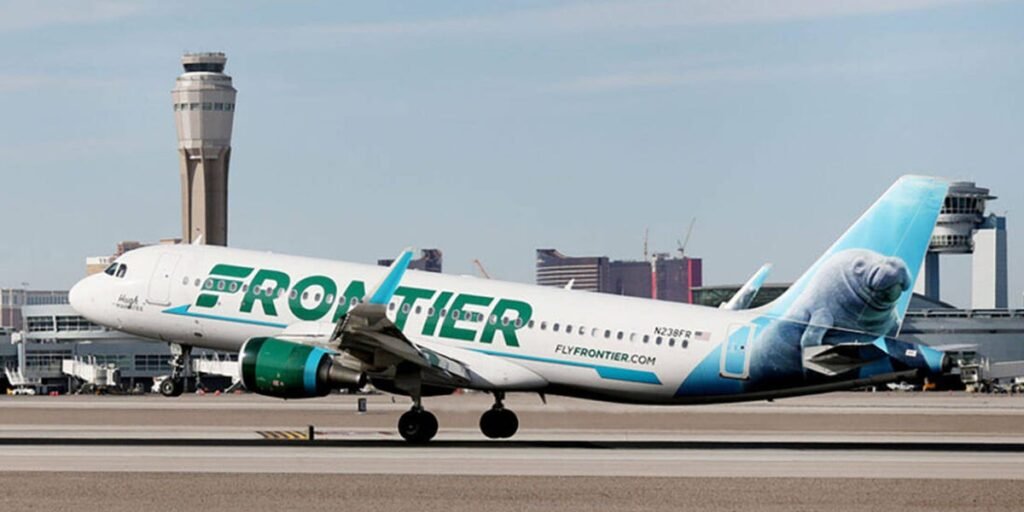- Frontier Airlines plans to introduce “first-class” seats in 2025.
- The move marks a shift from Frontier’s no-frills model amid competition from mainline carriers.
- Spirit Airlines has made similar changes to earn more revenue as it struggles to turn a profit.
Frontier Airlines is continuing to break from its classic budget business model as it chases more premium customers.
The airline will introduce “first-class” seats in the first two rows of the cabin starting in 2025, it said on Tuesday. These will come at an add-on fee, though Frontier did not disclose pricing.
Renderings of the new first-class show large loungers with headrests, spaced two across with larger armrests. They appear to resemble Spirit Airlines’ “Big Front Seat,” which is comparable to mainline domestic first class but without some amenities, like free alcohol or meals.
Frontier also announced new perks for its status members, hoping to create more value for the airline’s most loyal customers. A bonus mileage offer for new credit card applicants suggests Frontier also hopes to poach customers from competing airlines.
From early 2025, Frontier’s Elite Gold members and above can receive free upgrades to the new first class and its “UpFront Plus” seats, subject to availability. The latter is Frontier’s new business-class-like option that guarantees an empty middle seat — similar to what many mainline European carriers offer on shorter flights.
Frontier will also offer free unlimited companion travel for its highest-elite-status holders, meaning friends and family can tag along on flights. Further, starting in mid-2025, customers can buy seats, bags, and other ancillaries with miles.
“The New Frontier is our promise to deliver exceptional value with unbeatable flexibility,” Frontier CEO Barry Biffle said in a press release. “As we continue to innovate and elevate the customer experience, we’re proving that premium travel doesn’t have to come with a premium price tag.”
Shares fell about 5% following Tuesday morning’s announcement.
Frontier’s latest changes represent a departure from its traditional no-frills strategy. Its planes only offered economy, and everything besides an unassigned seat and a personal item cost extra.
Budget airlines like Spirit and Frontier — neither of which have turned a full-year profit in 2019 — have faced tough competition from mainline carriers that offer more premium options, like assigned seats and free carry-on bags.
Low-cost airlines have since had to adjust their business models to keep up with changing industry trends and target more premium customers who are willing to pay more for comfort and convenience.
Beyond Tuesday’s changes, Frontier has also largely eliminated change and cancel fees, now allows a free checked bag when customers book with their Frontier credit card, and has restructured its fare classes to offer customers more choice and flexibility.
“Instead of just nickel and diming, airlines like Spirit and Frontier are doing more bundling, which is in line with what we at Breeze do, and we’ve found success,” JetBlue Airways founder and current CEO of Breeze Airways, David Neeleman, told Business Insider in November.
Spirit has made similar changes to earn more revenue as it battles financial problems that led to a Chapter 11 bankruptcy filing in November.
This year, the airline has announced priority boarding for more eligible customers, seat selections with the middle seat blocked, the elimination of most change and cancel fees, and the option to book bundled fares.
Read the full article here

















